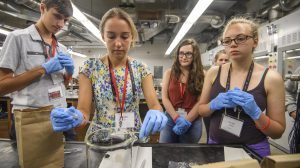
High school students (from left) Blake Howard, Caroline Sturgis, Peyton Jolley and Annija Westfall conduct a gunshot residue test during the third annual CSI Camp. Photo by Thomas Graning/Ole Miss Communications
OXFORD, Miss. – A dead body, blood spatter, guns, bullets and DNA samples – all fake – offered plenty of opportunities for gifted middle and high school students to test their forensic skills recently at the University of Mississippi.
Thirty-five seventh- through 12th-graders visited Ole Miss as part of a weeklong camp on forensic science. Sponsored by the American Academy of Forensic Science, the UM Department of Chemistry and Biochemistry and Division of Outreach and Continuing Education, the event drew students from Mississippi, Alabama, California, Illinois, Louisiana, Georgia, Maryland, New Jersey, Ohio, Texas and the District of Columbia.
Led by Murrell Godfrey, the university’s forensic chemistry program director, and his students, the group spent time honing detective skills while examining “evidence” throughout classrooms and labs in Coulter Hall.
“The students participated in daily labs where they participated in analyzing the crime scene evidence using high-tech instrumentation and techniques used in a real crime laboratory, including gas chromatography/mass spectrometry, infrared spectroscopy, liquid chromatography, comparison microscope, DNA analysis and gunshot residue analysis,” Godfrey said.
“The students then must defend their data and results as expert witnesses in a mock trial held on the last day of the camp.”
Ole Miss graduate student Caroline Spencer assisted with instruction, and undergraduate students Zachara Catchings and Ebone McCowan served as camp counselors. Cass Dodgen, project manager for summer programs, coordinated transportation, housing and meals.
Participants observed as Godfrey and others demonstrated the proper procedures for analysis of the staged evidence recovered from the mock crime scene.
Some of the hands-on activities include DNA, fingerprint, gunshot residue, bullet and drug analyses using the same high-tech analytical and physical techniques used in crime laboratories.
Forensic scientists who delivered lectures on different aspects of investigation included Darrell Davis, a retired DEA director from Dallas; DeMia P. Pressley, of the DEA Diversion Control Division in Washington, D.C.; Deedra Hughes, Mississippi Forensics Laboratory assistant director and DNA technical leader from Jackson; and Jennifer Tuten, a DEA forensic chemist from Dallas.
“It was such a great experience to be able to share what I do and participate in such a wonderful event,” Tuten said. “The students were even more interested and excited to learn than I could have imagined.
“I would have jumped on an opportunity like this one when I was in high school.”
A mock trial on the last day of the camp tests students’ knowledge on the various topics and labs.
“The students must serve as expert witnesses, prosecutors, defense attorneys, suspect and so forth,” Godfrey said. “The expert witnesses must defend their analysis of the different pieces of evidence found at the crime scene. A jury will then render a final decision in the case.”
Divided into smaller groups, the students rotated daily between labs in the chemistry department and stations for DNA collection, presumptive tests, ballistics and gunshot residue, fingerprints, and analytical chemistry and forensics. At each station, students analyzed their samples and collected data.
A double-decker bus tour of campus and the university’s Maynard W. Quimby Medicinal Plant Garden was arranged by Don Stanford, assistant director of UM’s Research Institute of Pharmaceutical Sciences.
This was the third forensics summer camp hosted at the university.
“This was our best CSI Camp yet,” Godfrey said. “We had 35 campers representing 11 states. Our goal is always to encourage these gifted young minds to become STEM majors once they enter college.”
Several students said they’ve learned a great deal through their experience.
“I expected to learn a lot about solving crimes,” said De’Monica Dumas, a ninth-grader from Shreveport, Louisiana. “During the week, I met some cool experts and learned what goes on behind closed doors when solving a crime.”
Senior Kayla Masari agreed.
“During the week, the experiences I have made have been life-changing,” said Masari, from Dumont, New Jersey. “It has proved to me that it is what I want to be. In addition to that, it has also made the University of Mississippi a top school on my list, and I definitely intend to apply to the forensic chemistry program.”
Other students were Meredith Archer of Tupelo; Alyssa Bencel of Nacogdoches, Texas; Grace Bennett of Waggaman, Louisiana; Nia Binning of Richmond, Georgia; Autumn Bishop of Pell City, Alabama; Amelia Block of Purvis; Katelyn Brooks of Saltillo; Terrell Caldwell of Stockbridge, Georgia; Lauren Colbert of Murphy, Texas; Lindsey Coulon of Bunkie, Louisiana; Kayla Fowler of Conroe, Texas; Axel Gonzalez of Mercedes, Texas; Rachel Harris of Belden; Darby Hesson of Westerville, Ohio; Blake Howard of Cedar Park, Texas; Leah Hughes of Brandon; Peyton Jolley of Bartonville, Texas; Nia Jones of Chicago; Lana Lauer of Beverly Hills, California; Alyshia Moore of Vicksburg; Francisco Munoz of Pharr, Texas; Heaven Ratcliff of Houston, Texas; Gesselle Sanchez of Welasco, Texas; Sydney Sanchez of Spring, Texas; Earline Saunders of Washington, D.C.; Shaelyn Simoneau of Kathleen, Georgia; Caroline Sturgis of Huntsville, Alabama; Isaac Trevino of Donna, Texas; Marija Westfall and Annija Westfall, both of Orange, California; John Wilkins of Bowie, Maryland; Sophia Williams of San Diego; and Tyler Williams of Oxford.
For more information about the forensic chemistry program within the Department of Chemistry and Biochemistry, visit http://chemistry.olemiss.edu/undergraduates/forensic-chemistry/.